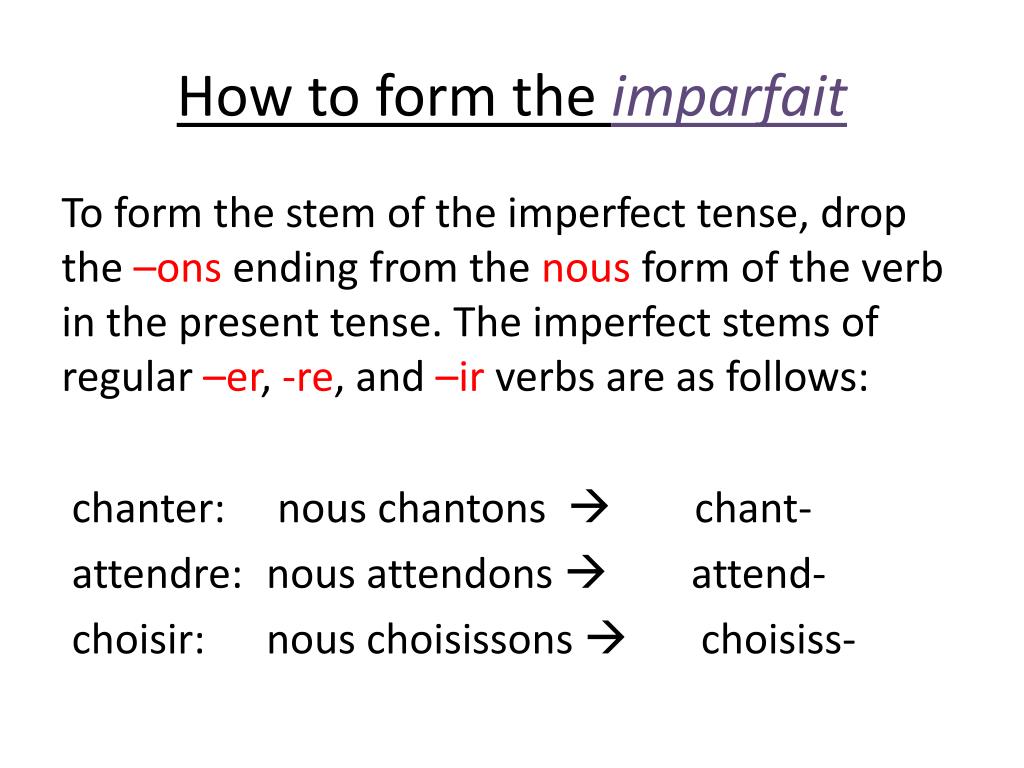

À exprimer l’ordre ou le souhait dans une proposition indépendante. (For the extra-extra-mile, as a simple French curiosity, there’s one last use of l’imparfait: l’imparfait “hypocoristique” = using l’imparfait in place of the present tense, to sound like you’re talking like a child, for endearment.)Īlors, c’est un peu complexe mais j’espère que cette réponse t’aidera un peu : = She was in the middle of walking out of the bakery.

Elle était en train de sortir de la boulangerie. = I am currently in the middle of eating. For instance: Je suis en train de manger.
#IMPARFAIT ENDINGS CONSTRUIT PLUS#
*** Le truc en plus *** For long actions (= progressive tenses), you can also use the everyday expression “ être en train de” = to be in the middle of. → Here, “ Elle allait” is a long action compared to “ elle a vu.” “ Seeing Michel” cut short her action of “ going to the bakery.” That’s why we use l’imparfait for “ elle allait,” and le passé composé for “ elle a vu Michel.” Le passé composé is the other main French tense for the past, and it’s used for short actions (that we take as a whole, rather than as a period of time.) = She was going to the bakery when she saw Michel. = I was already in Grenoble last year.Īnd for long actions in the past: Elle allait à la boulangerie, quand elle a vu Michel. Like: J’étais déjà à Grenoble l’année dernière. More generally, it’s used for situations in the past (that lasted some time). = I used to drive to the office every morning. J’allais au bureau en voiture tous les matins. Well, that’s the second meaning of l’imparfait : a habit, in the past. Il y a (there is) → il y avait (there was / there used to be) Il faut (Someone needs to…) → Il fallait (Someone needed to…) Il pleut (it’s raining) → il pleuvait (it was raining) Il neige (it’s snowing) → il neigeait (it was snowing)ĭid you notice? In the examples above, I sometimes translated l’imparfait with “ used to. Some impersonal verbs don’t always have a present form with “ nous” yet we still use them in l’imparfait. Most notably: Commencer(= to start) → Nous commençons (= we start, present) → In l’imparfait: Je commençais Nous commencions Tu commençais Vous commenciez Elle commençait Elles commençaient

So it always sounds like “ss” (as in “ ça” or “ ce”) and never like “ k” (as in “ ca” or “ co”). We add la cédille ( ç) for all subjects with -ai. Most notably: Manger (= to eat) → Nous mangeons (= we eat) → In l’imparfait: Je mangeais Nous mangions Tu mangeais Vous mangiez Elle mangeait Elles mangeaient Verbs in -ger add an -e before the endings of l’imparfait, with all subjects except “ nous” and “ vous.” Basically, we don’t want to hear the hard “ g” sound that would appear with “ g + ais.” So we turn it into “- geais” Fortunately, there aren’t many second-group verbs in everyday French ( grandir, nourrir = to feed…) – most verbs in -irare 3rd-group (like courir = to run, dormir = to sleep…) Unfortunately, there’s no real shortcut you have to learn the group of each verb in -ir you see.ī) Tweaks in first-group verbs, for pronunciation reasons


 0 kommentar(er)
0 kommentar(er)
